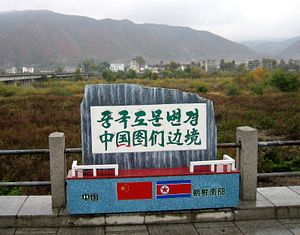Efforts to combat COVID-19 have taken a toll on trade and economic growth worldwide, but North Korea’s decision to close its border to prevent the spread of COVID-19 domestically has essentially brought its trade with China to a halt.
After shutting its border with China in late January, North Korean exports to China declined by 71.9 percent in the first two months of the year. The full extent of the damage was unclear at the time, however, because China changed its reporting to include January and February data in a combined period rather than as individual months.
New data for March paints a clearer picture of the damage the closure is causing to trade. As a result of the shut border, North Korean exports to China have virtually ceased, declining by 96 percent compared to March 2019 to a mere $616,000. Exports to China for the first quarter of 2020 were down 79 percent compared to the first quarter in 2019.
There was also a sharp shift in the composition of North Korea’s exports to China. Electricity was North Korea’s top export to China in March, accounting for 56 percent of exports. The rest of North Korea’s exports to China consisted of miscellaneous chemicals, iron and steel ingots, and a small amount of textiles. Previously, wigs and other false facial hair were among North Korea’s top export items to China, along with watches, toys, and sporting equipment. Exports of these and other items came to a halt in March.
Imports from China also fell significantly in March. After seeing a relatively small decline in the first two months of the year, North Korean imports from China in March declined by nearly 91 percent year-on-year to $18 million. In contrast, North Korea imported $197.4 million in goods over the first two months of the year from China. For the first quarter, imports from China were down 53 percent compared to the same quarter in 2019.
Imports of soybean oil and palm oil remained relatively stable despite the overall decline in imports, while imports of electricity were one of the few items up for the month. However, there were sharp declines in imports of consumer goods such as lamps, furniture, tobacco products, and soap, while imports of items such as beer and spirits, umbrellas, clothing, toys, games, pianos, and fishing equipment came to a halt in March. Inputs for North Korean industry were also impacted, as imports of watch parts for assembly fell to zero.
Of more concern is the impact the closure has had on imports of food and inputs for agriculture. The UN estimates that 10 million North Koreans are food insecure and in March there were sharp declines in imports of plastic sheeting used in agriculture and fertilizer.
In recent years, North Korea has maintained relatively stable levels of food imports, but in March imports of sausages, sugar, and flour declined significantly. North Korea also stopped importing rice, corn, chicken, onions, garlic, edible fruits and nuts, and confectionery items, among other food products.
While there have been periods where North Korea did not import a commodity such as corn for an extended period of time, it is the totality of the decline that is concerning.
With imports at minimal levels there have been signs of price increases in North Korean markets, especially in Hyesan. Of the three main food commodities that DailyNK tracks – rice, corn, and pork – all three have increased in price since the closure of the border, with the exception of pork prices in Pyongyang. A government decision in mid-April to stop the import of “unnecessary” items has also reportedly resulted in price increases for foreign goods.
March saw a staggering decline in North Korea’s trade with China. While there have been signs in April that trade may be slowly resuming, it is unclear how long trade will remain at depressed levels due to Pyongyang’s efforts to contain COVID-19. While the containment measures will limit North Korea’s ability to earn hard currency through legal trade and smuggling, it is also impacting North Korea’s ability to import food, which could result in a crisis of a different nature in the months ahead.
































